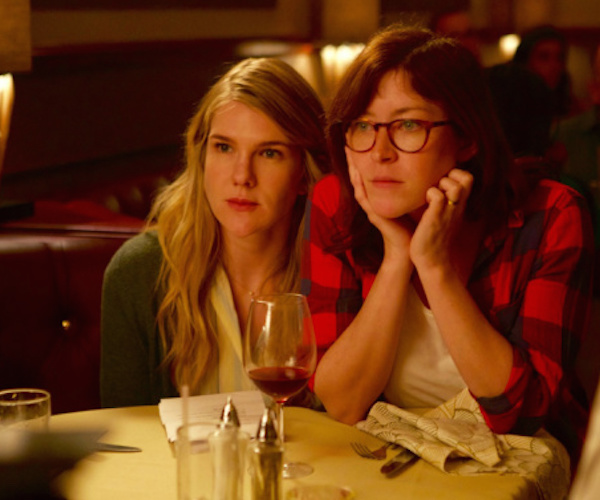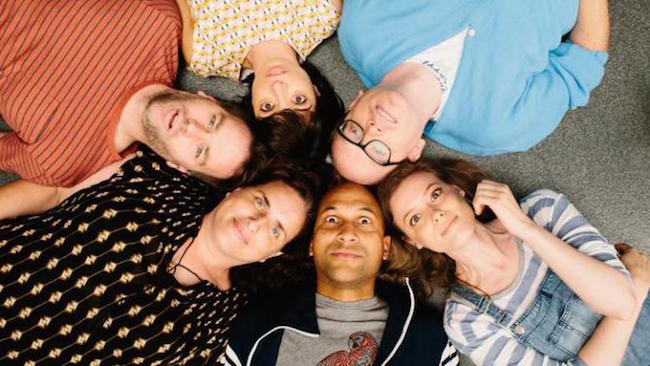Fuse Film Review: Critical Impressions of SXSW 2016
The Obamas coming to speak was a rowdy “FU” from the progressive-minded Fest to the rest of Ted Cruz Texas.

A scene from “Miss Stevens.” Photo: courtesy of SXSW Film Festival.
By Gerald Peary
What a coup for SXSW 2016, to coax both Barack and Michelle to liberal Austin to address the nerdy geeky crowds. The Obamas coming to speak was a rowdy “FU” from the progressive-minded Fest to the rest of Ted Cruz Texas. Another super-high this year: persuading comedian Mike Birbiglia, who was in town for his excellent new comedy, Don’t Think Twice, to stick around and host, gratis, the closing night Film Awards Ceremony. Was he irreverent and uproarious, making up “A” level put-down material on the spot! I laughed my tush off from the front row, which felt like a $200 seat. Slide over, Chris Rock!
The low point was that same closing night. The Best Narrative Film, SXSW’s most coveted prize, went to an abysmal feature called The Arbalist: stiff, epicene, poorly acted. Something about a toy inventor in the 1970s and his obsessive love. School of Wes Anderson affectation? I’m stunned that a jury of three went for this one. What were you thinking, The New Yorker’s Richard Brody? I bolted in the middle, craving some Austin air.
I only managed a handful of the films in the Narrative Competition. One work, Miss Stevens, about a deflated high school drama teacher chaperoning three of her thespian students on a weekend road trip, was fine by me, touching and sweet and slightly wacky in an Alexander Payne vein. Lily Rabe, daughter of Jill Clayburgh and playwright David Rabe, deservedly won a Best Actress citation from the Narrative jurors for her portrayal of this teacher at a crossroads trying to figure herself out, at the same time getting too enmeshed in the moody lives of her students. The three actors kids are terrific, and I kept thinking of James Dean, Natalie Wood, and Sal Mineo in Rebel Without a Cause. As you might recall, Mineo’s Plato in Rebel was a closeted character, secretly in love with Dean’s Jim. It was the 1950s. Miss Stevens’s Sam (Anthony Quintal) is openly out, his heart on his sleeve, and he’s one of the cutest, most winning gay adolescents in all of American cinema. How far have we come? He is embraced by his two high-school peers, both straight.
A shiny Miss Stevens apple to skilled, sensitive, first-time writer-director, Julia Hart, an ex-teacher who was inspired, she said in Austin, by her own conflicted time in the classroom.
I also admired In Competition collective: unconscious, an anthology film conceived and organized by Dan Schoenbrun, an ex-BU film student now employed by Kickstarter. Schoenbrun brought together a half-dozen Brooklyn-based indie filmmakers, and they made short films with the leaping-off conceit each others’ dreams. For surrealist inspiration, the filmmakers were put under, bewitched, by a professional hypnotist, repeating what Werner Herzog did decades ago with his actors for Heart of Glass. The best of the episodes is a complicated dance film by Josephine Decker, the svelte dance moves placed in counterpoint to the rhythms of a found African-American monologue.
Another feature film of merit: Free in Deed, a somber, deeply felt religious drama about a down-an-out African-American man trying to regain his humanity through his “born again” commitment. Shot with a telling, naturalist eye in the streets, motels, and churches of Memphis, Tennessee, Jake Mahaffy’s film dares, like France’s great director, Robert Bressson, to raise the most fundamental of spiritual questions: is God actually out there watching and listening? RISD graduate, Mahaffy, is now teaching in New Zealand. Free in Deed was co-produced by Cambridge’s Mike Bowes and sponsored by our very own LEF Foundation.
As for Don’t Think Twice, Mike Birbiglia improves, as writer-director, on his already OK 2012 debut, Sleepwalk with Me. This new one is a loving, knowing tribute to improvisation comedy going back to Second City and Nichols and May. Birbiglia plays a member of a fringe improv troupe in today’s New York which is peppy, energetic, sharp and entertaining, and yet remains fringe. Years in, everyone still has a laborious day job — except the rich girl who lives with her mom. Then one day, a hot smug sketch TV show (a not-at-all disguised SNL) comes a-knocking and hires one of them as a performer, another as a writer. Suddenly, as expected: gloom, jealousy, disarray.
Wickedly funny. Show biz with all its vanities. Here as an actor, Birbiglia generously melts into the superb ensemble which includes Keegan-Michael Key, Kate Micucci, Tami Sagher. Chris Gethard. It’s mean to pull out one performer for special praise, but I can’t help but wonder why the most fetching Gillian Jacobs isn’t actually on Saturday Night Live.

A scene from “Don’t Think Twice.” Photo: courtesy of SXSW Film Festival.
Documentaries at SXSW? I didn’t see The Tower, winner of Best Documentary and assorted other awards, looking back fifty years to Charles Whitman, the infamous rifleman who murdered 16 people on campus at U of T-Austin. The most startling non-fiction film I did watch was Accidental Courtesy: Daryl Davis, Race & America. Davis, an African-American pianist with a boogie-woogie bent, spends his time off stage courting KKK leaders, befriending them, and gradually convincing them that racism is stupid and wrong. As each Grand Wizard quits the Klan, he surrenders to Davis his infamous robe; and Davis has a home full of them. When Davis meets with young militant blacks, they accuse him of Uncle Tomism and misdirecting his life. But Davis nobly persists, changing odious white people one at a time.
He needs to have dinner with the Donald.
Let’s end with the awesome mainstream enjoyability of Bandit, made for yahoos everywhere, including me, the inside story of the making of the legendary Hollywood superhit, Smoky and the Bandit. Crashing cars, Southern babes, country roads, and Burt Reynolds in his iconic prime. As we learn, this genre classic was helmed by the most unlikely of first-time directors, Hal Needham, a dirt-poor Arkansas farm boy who became Hollywood’s most daring stuntman and also Reynolds’s roommate and best friend. Talk about old-time male bonding! Filmmaker Jesse Moss is on a lark after his depressing documentary masterpiece, The Overnighters. And a shout-out to editor Aaron Wickenden for figuring out how to piece together Smoky movie scenes, vintage interviews with the late Needham, and all varieties of video memorabilia stored in Reynolds’s Florida home.
Finally, it was great to see the game Reynolds live on the stage of SXSW’s Paramount Theatre though, at 80 (time doth fly!), the fabulous macho man is promenading about supported on a cane. He hasn’t retired, by the way. Back in Florida, as we see in the film, he gives Method acting lessons to the aspiring.
Gerald Peary is a professor at Suffolk University, Boston, curator of the Boston University Cinematheque, and the general editor of the “Conversations with Filmmakers” series from the University Press of Mississippi. A critic for the late Boston Phoenix, he is the author of nine books on cinema, writer-director of the documentaries For the Love of Movies: the Story of American Film Criticism and Archie’s Betty, and a featured actor in the 2013 independent narrative Computer Chess.
